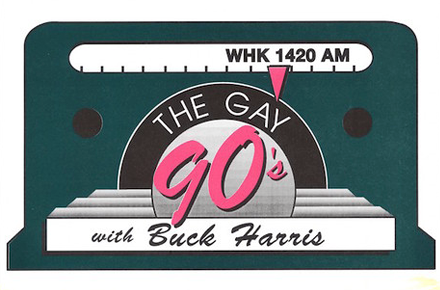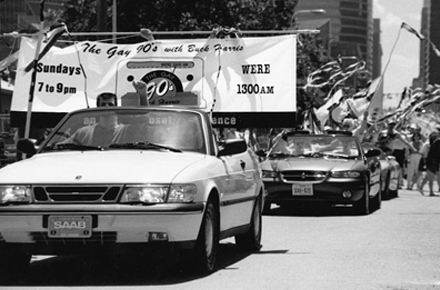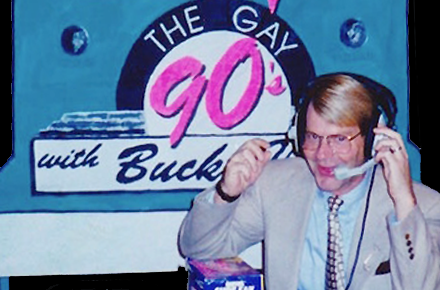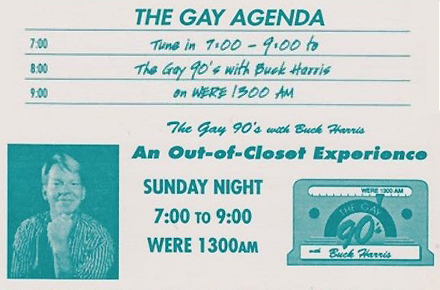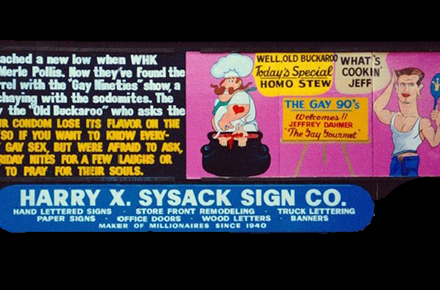The Buck Harris Collection
The Buck Harris Collection is a collection of artifacts, media and memorabilia originally gathered by Buck Harris, a leading figure of Cleveland's gay rights movement during the 1980’s and 1990’s perhaps best known for his ground-breaking AM radio show, “The Gay 90’s with Buck Harris”.
During the 1980’s, he was appointed by then-Governor Richard Celeste as Ohio’s gay health liaison, the first such position in the United States. He developed a training program for HIV counselors, led sex education workshops at the Cleveland Health Museum and taught safe sex at gay bathhouses and bars, distributed literature, raised funds for AIDS research, and eventually earned a commendation from the Ohio State Senate. He served as interim director of what is now the LGBT Community Center of Greater Cleveland, and helped to found the Ohio AIDS Coalition.
"The Gay 90's with Buck Harris" first aired on 1420 WHK-AM in 1993. Despite bomb threats and reactionary billboards, the show found broad audiences and sponsorship, functioning as an outlet and a voice for Ohio's gay community. Harris later moved the show to 1300 WERE-AM and ended it at the end of the decade in 1999.
About the Collection
The digital collection includes recordings of many episodes of “The Gay 90’s”. There are also some photographs, advertisements for the show, and scripts for comedic bits and mock-ads available on Cleveland Memory.
The physical collection takes up six linear feet and includes articles by and about Buck Harris, pieces of fan-mail and correspondence, cassette tapes of episodes and other sounds Buck Harris recorded, VHS tapes which were used or recorded during Buck Harris’ safe-sex talks, games, posters, t-shirts, pamphlets, and other assorted documents he produced and collected from 1984 into 2001.
More about Buck Harris
- The Gay 90s": Sometimes Serious, Sometimes Humorous, But Never Straight Talk" by Leda Carol Drake for Cleveland Historical
- Buck Harris, gay health and radio pioneer, dies at 70
Obituary by Grant Segall for the Plain Dealer, September 5th, 2018
Related Reading from
the Encyclopedia of Cleveland History & Cleveland Historical
- Gay bars in Cleveland
- Gay Community in the 1970's
- GEAR (The gay education awareness and resources) Foundation
- The GEAR Foundation For the Benefit of Cleveland's Gay and Lesbian Community by Katie Cummings
- High Gear
- Lesbian/Gay Community Service Center of Greater Cleveland
Media: The Gay 90's Radio Show
- First Broadcast: March 26, 1993
- June 25, 1993
- February 28, 1994
- February 25, 1996 MORE ABOUT THE GAY 90's
- A Turning Point | The Gay 90's: How a trailblazing radio show made history in Cleveland
Video from Cleveland's WKYC Channel 3
Other Media Resources
- Buck Harris on "Gay Waves"
Harris' safe sex slide show at the sixth annual CWRU All Ohio Lesbian Gay Conference, December 9th, 1997 - WRUM-FM's Gay Waves Radio Program
from Digital Case
About the Donor
The Buck Harris Collection was donated to the Cleveland State University Special Collections by Buck Harris himself. Born in Lakewood, Buck Harris graduated from Lakewood before spending a brief stint at Cleveland State University. Buck Harris then transferred to Antioch College’s campus in Columbia, Maryland, where he majored in Communications. While there, he got involved in the gay community in D.C. and taught vocational agriculture.
Buck later returned to Cleveland, where he was appointed to the position of “Gay Health Liaison” for the state of Ohio by then-governor Dick Celeste in 1984. As perhaps the first such liaison in the United States, Buck Harris initiated a series of programs focused on preventing the spread of HIV, raising awareness for AIDS, and encouraging safe sex in the gay community. Among them was The Bartender’s Gay Health Educator, where he educated staff at gay bars, clubs, hotels, and bathhouses on how to promote safe sex amongst their clientele. He also worked with the ACT-UP organization in order to provide anonymous HIV testing to closeted gay men and women in Ohio. He also made numerous TV and radio appearances around Ohio to raise awareness.
After leaving his government position, Buck Harris transitioned into entertainment, becoming the host of the AM radio talk show “The Gay 90’s with Buck Harris” in 1993. The show ran for six-and-a-half years, and Buck interviewed many figures in the gay and lesbian community at the time, including the world’s oldest out lesbian, Ruth Ellis, and the first openly gay candidate to run for federal office in Ohio, Eric Resnick. He would retire from the media world in 1999, and after a short campaign in 2001, left politics as well to run a nude yoga studio called “No Place Like Om” in Ohio City. He lived to the age of 70, dying in 2018 from lung cancer. He is survived by his widower, Mike O'Connor.
This project was made possible through a generous American Rescue Plan: Humanities Grants for Libraries grant. American Rescue Plan: Humanities Grants for Libraries is an initiative of the American Library Association (ALA) made possible with funding from the National Endowment for the Humanities (NEH) through the American Rescue Plan Act of 2021.
Special thanks to Madison Matuszak for his work describing, digitizing, and organizing the content of this collection during the summer of 2022.

